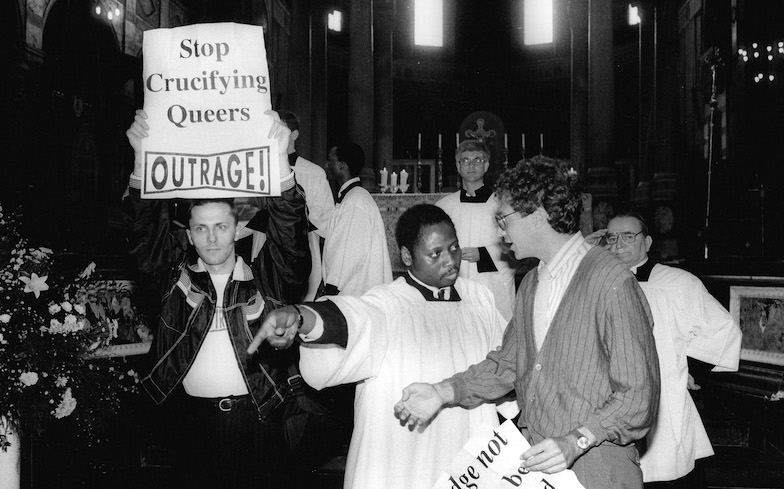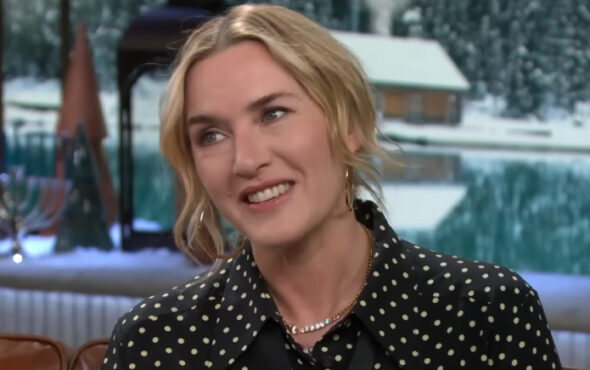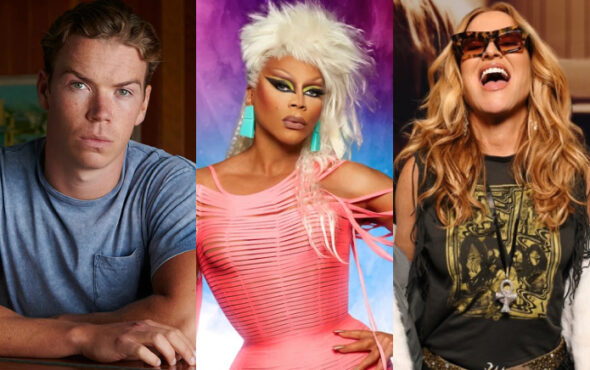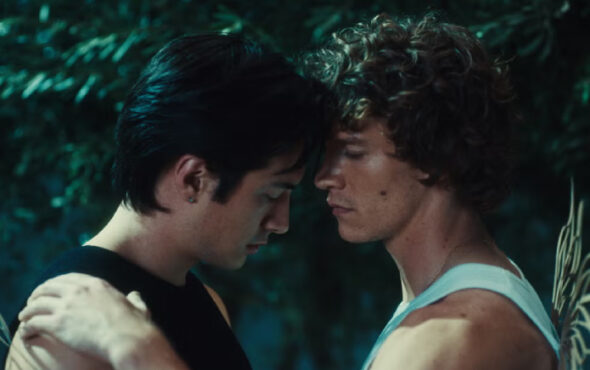
May 2020 marks the thirtieth anniversary of OutRage!, an organisation that was synonymous with the struggle for LGBTQ rights between 1990 and 2011, the years the organisation was in operation.
Lasting 21 years, OutRage! was the world’s longest running grassroots and volunteer-led LGBTQ rights direct action group. The three tenets outlined in OutRage!’s mission statement, still bear much relevance today:
- ASSERT the dignity and human rights of queers
- FIGHT homophobia, discrimination and violence directed against us
- AFFIRM our right to sexual freedom, choice and self-determination
In terms of historical context, following the partial decriminalisation of gay and bi men in England and Wales in 1967 with the Sexual Offences Act, the LGBTQ rights movement progressed in fits and starts. Comparable legislation was not enacted in Scotland until 1980 and in Northern Ireland until 1982. Sometimes it was a case of one step forward, two steps back, the most obvious example of this being the introduction of Section 28 of the Local Government Act 1988, which prohibited the discussion of LGBTQ issues in schools.
It was not Section 28 which was the catalyst for the formation of OutRage! though. In May 1990, 35 LGBTQ activists met at London’s Lesbian and Gay Centre, which was located in Farringdon. They became the co-founders of OutRage! There had been an upsurge in queer-bashing, including the murder of gay actor Michael Boothe in West London.
Instead of concentrating their efforts on catching the perpetrators of these crimes, the police were arresting LGBTQ people for, in Peter Tatchell’s words “consenting and victimless” behaviour. OutRage!’s first demands related to the police, including: “Protection, not persecution!” and “Policing without prejudice.”

The group embarked on a campaign of high-profile protests, including picketing police stations and disrupting under-cover police operations. As Peter Tatchell recalls:
“We secured media coverage that highlighted the way the police were rounding up gay men who harmed no one, while failing to resolve serious crimes like murder. This embarrassed the police and got them a lot of negative publicity. Very soon the police began to change tack. Within three years, the number of men arrested for gay sex fell by two-thirds – the biggest, fastest fall ever recorded. We saved thousands of men from getting a criminal record.”
From its inception, OutRage! worked on a non-hierarchical, volunteer-led basis. There were no paid staff, leaders or officers. As Fernando Guasch explains:
“There was passion, friendship, fierce argument, and an exhilarating sense of kicking back against the bastards. It all changed us in some very deep ways.”
Lynn Sutcliffe emphasises that the group was its own education:
“OutRage! was my youth, my university like no other. It taught me things that have never left me – the strength to stand up for what I believe in, the passion to have faith that things can and will change.”
The group prided itself on being independent of rich donors and often undertook radical non-violent direct action and civil disobedience, such as ambushing the then Prime Minister John Major’s motorcade in 1994, after the the Houses of Parliament voted in favour of maintaining a discriminatory age of gay sex.
Sarah Hews recalls how the group’s provocative and innovative actions effectively drew much needed publicity to the LGBTQ cause. In 1992, she and her partner Lynn Sutcliffe were one of five OutRage! couples who made the first challenge to the ban on same-sex marriage. They made their bid at Westminster Registry Office, having borrowed a wedding dress from a drag queen. Sarah notes:
“Two lesbians wearing white wedding dresses and veils caught the press attention and the pictures appeared in newspapers all over the world.”
OutRage!’s ethos was based on the suffragettes, black civil rights movement, ACT UP and Queer Nation in the USA as well as the 1970s Gay Liberation Front in Britain, which some of its first members had been involved with.
Expanding on the ideas of those movements, OutRage! campaigned not merely for equal rights for LGBTQ people. OutRage! aimed for more ambitious reforms to transform society and homophobic social institutions, including the Church, police, media and education systems, which since their formation had been persecuting not just LGBTQ people, but anyone who was not white, male and straight.

OutRage! advocated far-reaching sexual freedom, to benefit not just LGBTQ people, but everyone – all genders, straight and gay! Its goal was not assimilation for LGBTQ people within what it saw as an unjust society. The members were critical, sceptical and dissented from the status quo. Instead of just arguing for LGBTQ-inclusive sex education in schools, for example, they urged earlier, better quality sex education for all pupils.
And it is incorrect to lump OutRage! with other LGBTQ organisations formed in the UK at this time, such as Stonewall, whose approach was then focussed overwhelmingly on parliamentary lobbying and law reform. OutRage! did engage with politicians, but it was never primarily a political pressure group. It had a much a much wider reform agenda, including cultural change to win the public to support LGBTQ rights.
This was action for LGBTQ people and by LGBTQ people. Stephen Mayes reflects on what made the organisation unique, including, that it was:
“insulated from party political influence, the intelligent planning and strategic thought behind even the most ridiculous actions, the audacity of ambition and the refusal to be cowed by power or violence.”
It is fascinating to look at photographs associated with OutRage! I was born in 1985 and first attended a Pride event in my early twenties, probably during Tony Blair’s second or third term as Prime Minister. By then a lot had changed. OutRage! photographs from Pride events show just how different they were to the carnivals many of us attend today.
Looking at images dating from the 1990s until the millennium, our symbol of choice was not the rainbow flag (which hardly appears), but the pink triangle used by the Nazi’s to single out homosexuals in the concentration camps.
The LGBTQ marchers and their allies were in the low thousands and they gaze austerely out of the images, battle hardened rather than wondering which pop star will next grace the Pride stage. Barriers were erected by the police not to keep the pro-LGBTQ crowds back, but to repel fascist protesters.
There are some familiar faces carrying the placards and banners, such as Peter Tatchell. Other faces belong to those whose names are no longer on the tip of the tongue. Maybe they went on to focus on their careers or family life? Maybe they died of AIDS? For some we will never know. Their contributions were equally valid and important at a time when it was not easy to be LGBTQ.
OutRage! was always quick to evolve and in tune with the zeitgeist. Tony Blair came to power in 1997. While there is a tendency to idealise this period, as it did represent a watershed in terms of social change, many OutRage! campaigns focused on how slow Labour was to implement the pro-LGBTQ policies it touted before the election. Without the work of OutRage! many rights LGBTQ people now take for granted may never have materialised.

Peter Tatchell sums up OutRage! as follows:
“It was a remarkable social movement, that did so much to mobilise the grassroots LGBT+ community on scale never seen before and raise public awareness about the enormity of anti-LGBT+ discrimination. We challenged and shamed homophobes everywhere and put the government and public institutions under pressure to change. OutRage! did an average of two non-violent direct action protests every month. People were willing to get arrested if need be – and many were. Our protests were daring, imaginative and often witty, drawing on LGBT+ traditions of camp and theatricality. The six-month-long Equality Now! campaign in 1992 was probably the most sustained equal rights campaign by any marginalised minority in the history of the UK.”
Indeed, OutRage! was responsible for extensive change, both in the UK and internationally. And its legacy lives on, as is clear from the testimony of its former members.
Peter Tatchell continues the ideals and work of OutRage! as Director of the The Peter Tatchell Foundation and I would encourage you to donate to this most worthwhile of causes.



